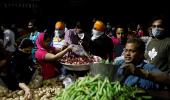Most key rabi-producing states of north India, such as Madhya Pradesh and Rajasthan, have staggered their procurement to enable farmers to come in batches, so that there is no overcrowding.
The Centre has also set up a call centre to coordinate the inter-state movement of farm commodities.

Following an order from the prime minister during his meeting with state chief ministers on Saturday, the agro marketing machinery across the country has been geared up to activate the supply chain from farm to retail dealers in the next phase of the lockdown.
Farmers in almost every state have been facing difficulties in harvesting and selling their crops.
Some states have started direct procurement, while others have resolved some of these issues.
Most key rabi-producing states of north India, such as Madhya Pradesh and Rajasthan, have staggered their procurement to enable farmers to come in batches, so that there is no overcrowding.
The Centre has also set up a call centre to coordinate the inter-state movement of farm commodities.
Maharashtra: Moving swiftly to restore mandis
Chief Minister Uddhav Thackeray held a meeting with agricultural produce market committee (APMCs) and mathadi leaders to convince their members to resume work and help open mandis.
Discussions were being held until Monday evening to finalise detailed operational guidelines for solving issues faced by farmers and traders and other concerns.
Following the meeting, it has been decided the Vashi grain mandi will resume operations in the next few days, while efforts are on to restart vegetable mandis and other markets in the state.
Gujarat to issue standard operating procedure
Many market yards are closed in the state.
The government has told them to resume operations on Wednesday and comply with state guidelines.
However, not all the markets are prepared.
A few like Gondal, one of the largest in the state, has said that if proper functional arrangements are made, their traders are prepared to go to farmers’ doorsteps to buy produce.
“Now that APMCs are supposed to restart on April 15, the government is in the process of finalising a standard operating procedure to ensure supplies are not affected, yet proper care is maintained to prevent the spread of Covid-19,” said Manish Bhardwaj, secretary- agriculture, farmers welfare & co-operation department, Gujarat.
UP deploys 40,000 vans, carts
The state government has deployed more than 40,000 motorised vans and manual carts for door-to-door delivery of fruit and vegetables, according to additional chief secretary Awanish Kumar Awasthi.
It had also ordered for the unhindered supply of harvested wheat, oilseeds, and pulses to the 250-odd notified mandis in the state.
Farmers have been allowed to sell directly to producers’ organisations.
The government will pick up 5.5 MT wheat at MSP for which it has set up 5,500 purchase centres and issued online tokens to avoid crowding at the markets.
Telangana for direct procurement
The government is ensuring the adequate movement of trucks from Krishnapatnam port, the entry point of edible oil and dal (pulses) into the state, said Commissioner-Marketing Laxmi Bai.
At the back end, the government is procuring rice and maize directly from farmers from around 6,000 purchase centres.
Paddy procured by the government is being sent to rice mills, from where the grain is made available to the Food Corporation of India (FCI) and the state civil supply corporation for distribution through the PDS.
The agriculture marketing department operates around 345 rythubazars, besides mobile vans for sale of vegetables to consumers.
These rythubazars have been receiving close to 4,000 tonnes of vegetables every day.
AP fixes retail price caps
The state government has determined the retail price limits of all the major agriculture commodities, and officials say Andhra Pradesh has sufficient stock of pulses and other commodities for the next few weeks.
The state is also taking steps to ensure movement of trucks carrying pulses, wheat flour and other commodities from Maharashtra and Hyderabad to maintain supply in local markets.
The agriculture marketing department has set up 200 rythubazars in addition to the 100 existing ones for the sale of vegetables.
The department is also operating 300 vans to sell vegetables in towns and colonies, said Israr Ahmed, CEO of rythubazars.
The government is procuring the entire paddy and maize, too, from farmers in the rabi season.
It has also set the minimum support price for various horticulture crops.
TN gives financial support for procurement
It has made arrangements for the commencement of plantation of seedlings for the “summer” paddy crop, and announced loans for procurement agencies to buy produce directly from farmers’ doorstep.
The state also announced loans of Rs 10 lakh to agencies for procuring fruit and vegetables directly from farmers, and the horticulture department has started an e-commerce door-delivery platform.
Intra-state and inter-state transportation of harvesting machines and horticultural equipment has also been allowed, according to chief secretary K Shanmugam.
There are fixed timings for unloading goods at retail shops in the morning, and at wholesale shops in the afternoon.
The Chennai Corporation announced plans to roll out 7,000 mobile grocery units across the city last week.
The Koyambedu wholesale market is offering assorted vegetable and fruit packs for doorstep delivery.
Punjab for extended procurement operations
For procurement and sale of foodgrain, the entire operation will be scattered over 10 weeks, instead of three weeks normally.
Farmers will be given chits mentioning the specific day and time when they can come and sell their produce.
"When the crop used to arrive at mandis, it would take two-three weeks.
"It is the largest food procurement operation undertaken anywhere in the world.
"However, this year, instead of finishing it in three weeks, we are going to do staggered purchase in 2.5 months to ensure social distancing."
Centres for purchasing produce from farmers also increased to around 3,691 in the state by converting 1,824 rice mills into centres.
Similar arrangements have been made in Rajasthan and Haryana.
Bengal announces app
With the rice harvest season nearing, the West Bengal government has announced the creation of an app that will obviate the need for farmers to come to the markets to sell their produce - the government will procure it from their homes.
Farmers continue to have a tough time in the state, though.
Many wholesale markets are shut.
The state government runs a chain of fair-price field produce stalls.
Of the 187 such stalls, only 32 are open.
MP plans home delivery
Madhya Pradesh plans direct delivery of horticulture products.
Wheat procurement has started and special arrangements have been made to ensure farmers come in batches, while the government has allowed door-to-door procurement.
Odd-even at Delhi mandis
The vegetable market of Azadpur in Delhi, which is among the biggest in Asia, has introduced the system of odd-even and staggered timings.
The same is being followed by the Okhla mandi.
Traders have been told to bring only one truck daily to avoid overcrowding.
Odd-even rules may also be implemented at other markets.
Odisha eases fisheries norms
The government has relaxed some restrictions for agriculture, fisheries and allied activities for the second phase of lockdown in the state.
Photograph: PTI Photo
Inputs from Rajesh Bhayani, Vinay Umarji, Virendra Singh Rawat, Dasarath Reddy, T E Narasimhan, Sanjeeb Mukherjee, Dilasha Seth, and Namrata Acharya












 © 2025
© 2025